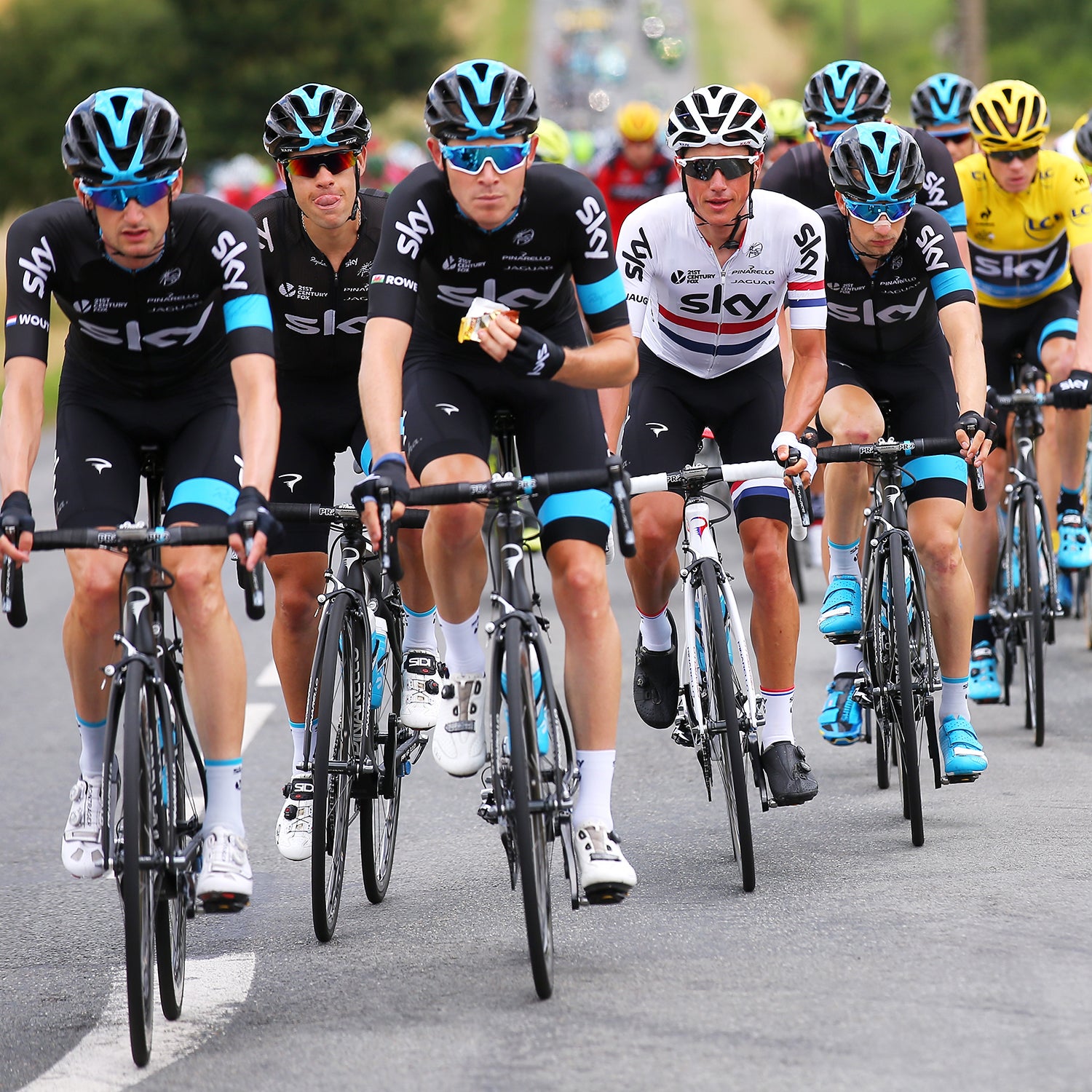When British TV network Sky announced in December that it would of its eponymous pro cycling team, the team’s future instantly became the most important issue of the off-season. Sky is the most dominant team in stage racing, thanks largely to a sport-leading budget of in 2017, more than of teams in the WorldTour. Aside from its own destiny, the team’s demise or survival would influence cycling’s competitive balance, dramatically shaping how races themselves are won or lost. Those questions were answered today.
In a press release, Team Sky announced that Ineos, a major international chemicals company headquartered in London, will take over the ownership of the team on May 1. (Team Sky is unusual in pro cycling in that the entire operation is owned by the sponsor, instead of a separate holding company. Switching sponsorship means selling the team.) While this is great for the team, it’s decidedly more ambivalent for the health of the sport overall.
The news, rumored for weeks, puts an end to the speculation—a ! A buyout by ! A for new star Egan Bernal!—that has followed the team in the early part of the 2019 season. Ineos-née-Sky will remain firmly British. Hell, the jersey colors .
But the biggest news item is the budget. A mid-season sponsor switch is rare in pro cycling, and means that Ineos is assuming Sky’s current contractual financial obligations (which have likely grown since 2017). That is: the team will continue to be the Imperial Death Star of pro cycling, vaporizing the competition with superior talent.
What’s more, some of the stories around Ineos’s impending sponsorship have that the budget in future years . So the team will continue at least at its current level, a prospect that is probably not great for the sport overall.
Team Sky is pro cycling’s one percent. They’ve recently dominated the Tour de France, the sport’s marquee event: six wins the last seven years, including a 1-2 finish in 2012 and a 1-3 finish last year. The only year they didn’t win, 2014, star rider Chris Froome crashed out early.
Led by general manager Dave Brailsford, Sky talks a good game about marginal gains and better training, but there are no major trade secrets in endurance sports, no  that Sky knows that other teams don’t. Sky’s advantage is budget, which allows it to buy virtually any rider it wants, race them sparingly, hire top support staff and hold training camps to build fitness for a few specially targeted events, and then strangle stage races with the inexorable application of brute force over seven to 21 days. (These tactics work less well in the wilder one-day events, a discipline where Sky is far less successful.)
What’s more, Sky’s outsize budget has always of a realistic return on investment, according to some knowledgeable players in the sport I’ve spoken with in the past, like Jonathan Vaughters, manager of the EF Education First team. Team Sky strenuously disputes this and told me last year that independent research from Nielsen shows more than $550 million in exposure the last nine years. But team representatives did not provide any data to support these claims, and measuring value in sports sponsorships is .
Since Sky’s budget began to grossly outstrip rivals in 2012, I’ve viewed the team as a patronage sponsorship, personally driven by James Murdoch, the former chairman and CEO of Sky. That hunch was largely confirmed when Sky announced, shortly after the company sold to U.S. telecom giant Comcast, that it would stop sponsorship. (Murdoch was the company when the sale closed; without him, there was no political will for a $30 million line item for a cycling team.)
Patronage sponsorships are . But as a sustainable business model, they’re questionable, depending on the fortunes and whims of sugar-daddy backers. Sometimes, funders get frustrated and leave teams to fold (, Rick Delaney and ). Sometimes, they pass away before a replacement can be found (Andreas Rihs and BMC). Sometimes, they come with (UAE-Emirates).
I suspect Ineos is the same. Sure, Ineos is a massive company, with some $85 billion a year in revenue. But the financial realities that made sponsorship unattractive to Comcast are still present. So what accounts for this largesse? Likely two words: James Ratcliffe.
Ratcliffe is Ineos’s co-founder, majority shareholder, chairman, and CEO. He is—or was, having recently moved to Monaco for tax purposes—the richest man in Britain, with an of over $13 billion. He’s also a sports enthusiast and, like a lot of rich people, appears to enjoy owning expensive toys. Ineos bankrolls a sailing team targeting the 2021 America’s Cup () and Ratcliffe bought a Swiss Super League football club in late 2017 (an offer to buy top English Premier League team Chelsea was ). Team Sky must have been an alluring opportunity. Sky is expensive for pro cycling, but cheap compared to a yacht club or top football team. And at current budgets, it can almost guarantee a win in one of the most prestigious sports events in the world. That’s quite a plaything.
That’s the bigger problem here. Without some way to level out budgets, deep-pocketed sponsors will pro cycling. Team Sky likes to say that tearing the team down for its success doesn’t help the sport; what other teams should do is invest like they have. That’s too cute by half. There are certainly teams that underperform their budget (one of the least-reported stories in pro cycling is the shambolic mismanagement of Katusha, one of the few teams with a budget to Sky’s). But given what rival teams like Jumbo-Visma, Sunweb, and Mitchelton-Scott have accomplished on smaller budgets, I guarantee that you if you gave any of them $40 million a year, within two years they’d put Brailsford’s team on its ear. The problem is that that kind of money does not seem to be out there; if it was, other teams would find it. And, at least for corporate marketing departments accountable to a real bottom line, no amount of wishcasting by Team Sky staff will change that.
Think about it: Sky’s success has firmly established the price of entry to be competitive at the Tour, which does not seem in line with financial fundamentals for marketing. That means that companies looking at a conventional sponsorship, tied to, you know, reality, don’t see an attractive opportunity, leaving the wealthy-patron model as the only viable path to a competitive Tour team.
More to the point, for fans, Ineos’s backing suggests that the Tour de France, at least, will continue to be dominated by a single team for the foreseeable future. Yes, Froome and 2018 Tour winner Geraint Thomas are nearing their mid-30s, when Grand Tour performance begins to decline precipitously. But the team is stocked with young stars like Bernal and Ivan Sosa (who was set to sign with another team last year before a late offer from Sky led him to flip). And with their budget assured, they can confidently pursue stars from other teams as well. Short of another wealthy team patron starting an arms race, Sky’s dominance at the Tour looks set for the next season or two at least.
Rivalries are good for sport. Bostonians aside, America gets bored of the New England Patriots winning yet another Super Bowl. But the biggest rivalry in last year’s Tour wasn’t between Sky and another team, it was between Froome and his teammate, eventual winner Geraint Thomas. Dynasties, it turns out, aren’t even always


